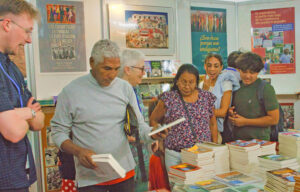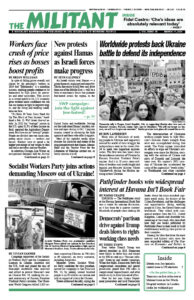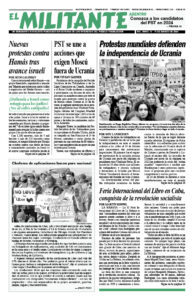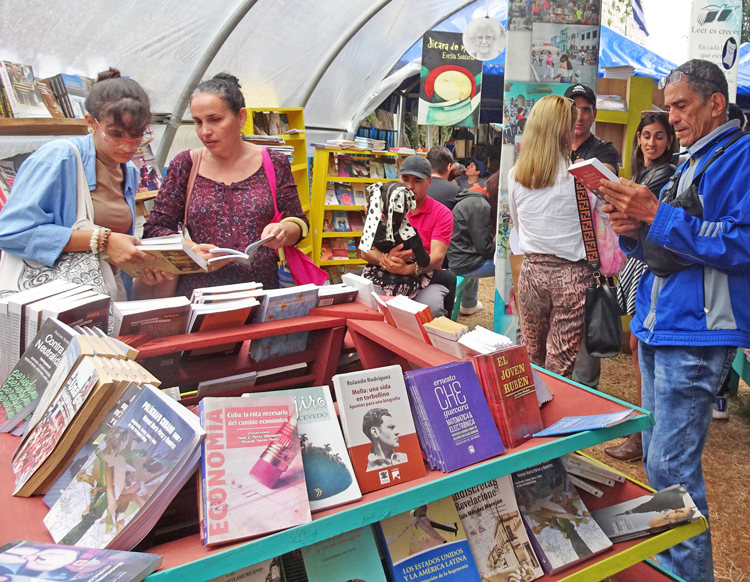HAVANA — The Pathfinder stand at the Havana International Book Fair was a center for nonstop discussion, as it has been for a quarter century. Hundreds of people came looking for books about the crisis-wracked capitalist world today, the history of the Cuban Revolution, and the challenges and opportunities facing working people in Cuba, the United States and worldwide. They talked with communist workers from the U.S., United Kingdom, Canada and Australia volunteering at the stand, who described how they use books published by Pathfinder Press in their work to build revolutionary working-class parties in their countries.
Among the titles that drew the most interest and highest sales were the new, expanded edition of Che Guevara on Economics and Politics in the Transition to Socialism by Cuban author Carlos Tablada; The Jewish Question: A Marxist Interpretation by Abram Leon; The Low Point of Labor Resistance Is Behind Us: The Socialist Workers Party Looks Forward by SWP leaders Jack Barnes, Mary-Alice Waters and Steve Clark; and Women in Cuba: The Making of a Revolution Within the Revolution by Cuban leaders Vilma Espín, Asela de los Santos and Yolanda Ferrer.
Two librarians from the University of Computer Science in Havana were visiting different stands to stock their library with new titles. At the Pathfinder booth they chose several books, including the book by Tablada. “It’s important for our students to be knowledgeable with what Che said about socialism,” Yaylín Montoya said. “I like this edition, because it gives you sources for all the quotes by Che.”
Her co-worker, Maylen Viñes, picked up The Low Point of Labor Resistance Is Behind Us. She wanted to read what it said about struggles by workers in the U.S. against dangerous job conditions and brutal work schedules. Viñes said a Cuban friend of hers had moved to the United States and got a construction job. “He says he’s constantly working and has almost no free time.”
Other visitors to the booth also had relatives among the more than 400,000 Cubans who have migrated to the U.S. the last two years, and had similar stories. They spoke about the shock of their family members at how bosses there push them to work faster, unsafely and for longer hours.
Interest in U.S. class struggle
Yuriatl Masó, a candymaker and baker for a state company, was interested when Gerardo Sánchez, a member of the Socialist Workers Party and the Bakery, Confectionery, Tobacco Workers and Grain Millers union in Texas, used one of the photo displays in the booth to illustrate solidarity activity he’s been helping to organize between striking members of his union in Memphis, Tennessee, and sugar cane workers in the Dominican Republic.
“I’m for friendship between the U.S. and Cuba,” Masó told this Militant correspondent. “But I don’t like Donald Trump.” This was a frequent comment we heard from Cubans.
I pointed out that, in their frenzied partisan drive to stop Republican Trump from being reelected, the Democrats are leading an attack on him that deals blows to free speech, due process and other rights guaranteed by the U.S. Constitution. “Both the Democratic and Republican parties, both Joseph Biden and Donald Trump, represent the capitalist rulers,” I said. “Every U.S. administration since 1959 has maintained Washington’s economic war against the Cuban Revolution.”

The SWP and our candidates explain that workers need to organize independently of both, on a road to taking state power, I said, “like workers in Cuba did. We need to defend democratic rights to organize and act, rights working people have won in struggle and have fought to defend for some 250 years.”
“That’s for sure,” Masó replied.
Andrea Reynaldo, a pre-university student, bought Malcolm X, Black Liberation, and the Road to Workers Power by SWP National Secretary Jack Barnes, another of the best sellers, and Socialism on Trial. This book reprints then SWP National Secretary James P. Cannon’s testimony in a federal courtroom in 1941. Cannon and other SWP leaders were framed up for leading labor opposition to Washington’s drive to enter World War II to advance the U.S. rulers’ imperialist interests.
“I want to know the history of the United States from the point of view of the working class and the oppressed,” Reynaldo said.
Many discussions revolved around economic pressures faced by Cubans as a result of the world capitalist crisis, exacerbated by Washington’s unrelenting determination to punish the Cuban people for making and defending a socialist revolution.
A biotechnology scientist who bought Che Guevara on Economics and Politics in the Transition to Socialism said that in her workplace, due to the U.S. embargo, they don’t have the equipment they need, much of which has to be imported. She and her co-workers work together to find ways around the difficulties. “We joke that we’re performing alchemy,” she said.
Nanchy López, who works for a publishing house in Pinar del Río province, came back to the booth for several discussions with Andrés Mendoza, a member of the Communist League in the U.K. “I’m worried some young people in Cuba are becoming more selfish. I educate my son on the values and principles of the revolution,” López said, which are the alternative to where capitalism is headed.
Mendoza pointed out that the absence of revolutionary advances in the world today weighs heavily on working people in every country, including the imperialist centers. A new and advancing socialist revolution would give a big political boost to working people, from the U.K. to Cuba. “That’s what my party fights to do, and why the example of Cuba’s socialist revolution is so important to workers everywhere,” he said.
Discussions on world politics
Fabián Acosta, a farmer from a vegetable cooperative near Alquízar, a town southwest of Havana, said he’s visited the book fair for many years. Farmers in Cuba today are seriously hampered by shortages of fuel and fertilizer, he said, a result of global capitalist conditions and Washington’s draconian sanctions. These punitive measures are designed to strangle Cuba’s access to credit and hard currency in the world market and impose great hardships on the Cuban people.
“We sell half our produce to the state, which now has to pay us by credit card or bank transfer because of the shortage of cash,” Acosta said. “But it’s cash that we need for most of our purchases.”
Acosta left the Pathfinder stand with Cuba and the Coming American Revolution and an issue of the New International magazine featuring “Our Politics Start with the World,” both by Jack Barnes. “I know our future is bound together with that of working people the world over,” he said.
There was a lot of interest in New International articles such as “The Opening Guns of World War III” and “Capitalism’s Long Hot Winter Has Begun.” These books help in understanding capitalism’s growing world instability — from escalating U.S.-China trade conflicts, to the election of self-described “anti-establishment” politician Javier Milei as Argentina’s president, to the renewed arms race among major capitalist powers. Moscow’s invasion of Ukraine opened the first major land war in Europe since the second imperialist world war.
Dozens of people bought The Jewish Question, whose author, Abram Leon, was a young Jewish communist who died at the end of World War II in the Nazi gas chambers of Auschwitz. Many who picked it up said they wanted to understand the roots of persecution of Jews, and there were many thoughtful exchanges on the question.
Volunteers at the stand explained what Leon develops in his book. As the deepening crisis of the capitalist system increasingly spawns instability, breakdowns and wars, the bourgeoisie foment Jew-hatred to divert the anger of desperate middle-class layers and some sections of workers get caught up in this. It is the working class and our unions who are the real target, however. The entire history of the imperialist epoch has shown this.
In the deepening capitalist crisis that led to World War I, pogroms against Jews were unleashed across Russia and Eastern Europe — and it was only the victory of the October Revolution in Russia when the working class took power under the leadership of Lenin and the Bolshevik Party that centuries of oppression of Jews throughout those lands was brought to a halt. But in capitalist Europe the Nazi Holocaust, which killed 6 million Jews, showed what awaits Jews everywhere — including in the Mideast — without socialist revolution.
The Oct. 7 massacre of Jews in Israel was a pogrom orchestrated by Hamas. The organization’s founding charter calls for the eradication of Jews and the state of Israel. It’s a manifestation of the imperialist crisis today helping fuel the rise in Jew-hatred worldwide.
A number of visitors wanted to discuss the multifront war in the Mideast now centered in Gaza. Many thought it was an unjust war by Israel aimed at annihilating the Palestinian people, with a few insisting Hamas was a national liberation movement. Some were horrified by the Oct. 7 slaughter. A few thought Israel has a right to exist as a refuge for Jews from persecution.
Many others said they didn’t know much about these questions and wanted to find out more. “I bought this book [The Jewish Question] to get more information,” said artist Michel Meulenert.
Pride in Cuban Revolution
Interest in books on the fight for women’s emancipation was high. One of the first titles to sell out was Cosmetics, Fashions, and the Exploitation of Women by Joseph Hansen, Evelyn Reed and Mary-Alice Waters. Others included Women in Cuba: The Making a Revolution Within the Revolution and Women’s Liberation and the African Freedom Struggle by Thomas Sankara.
“Women have made huge strides in Cuba,” said Mayte González, a University of Havana student. “But there is greater pressure on women to think that beauty is something that can be painted on. It’s a consequence of the economic changes of recent years that have increased the influence of the capitalist market,” she said. “It’s what Karl Marx called ‘commodity fetishism,’ material objects that seem to take on magical powers and have a negative impact on relations between people.”
González said she appreciated the quality of Pathfinder’s books, and the fact that thanks to donations from workers in other countries they were being sold here at prices accessible to most Cubans.
As during book fairs in Havana going back to the 1980s, many visitors to the Pathfinder stand expressed pride in the country’s socialist revolution. Ramón Rivero Santana, who got Che Guevara on Economics and Politics in the Transition to Socialism, said he had served as a volunteer doctor in Angola and Venezuela. “In Africa we saw a lot of AIDS, malaria and other diseases that we don’t have much of here,” he said.
Andrés López, a cook, pointed to a photo in the same book of Ukrainian children arriving in Cuba in 1991 to receive free medical treatment after the Chernobyl nuclear disaster. López works at the Tarará medical facility outside Havana where the Ukrainian youth had stayed.
“Che and Fidel taught us about the importance of internationalist solidarity,” López said. “Our experience with the ‘children of Chernobyl,’ which was initiated by Fidel, was one of our most beautiful expressions of internationalism.”


